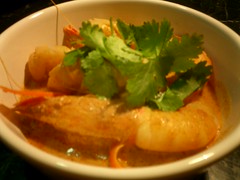The origin of the name "laksa" is unclear. One theory traces it back to Hindi/Persian lakhshah, referring to a type of vermicelli, which in turn may be derived from the Sanskrit lakshas (लकशस्) meaning "one hundred thousand" (lakh). It has also been suggested that "laksa" may derive from the Chinese word 辣沙 (Cantonese: [lɐ̀t.sáː]), meaning "spicy sand" due to the ground dried prawns which gives a sandy or gritty texture to the sauce. The last theory is that the name comes from the similar sounding word "dirty" in Hokkien due to its appearance.[citation needed]

Style (Laksa Udang)
There are two basic types of laksa: curry laksa and asam laksa. Curry laksa is a coconut curry soup with noodles, while asam laksa is a sour fish soup with noodles. Thick rice noodles also known as laksa noodles are most commonly used, although thin rice vermicelli (bee hoon or mee hoon) are also common and some variants use other types.[citation needed]

Laksa udang banjir - Image
Curry laksa (in many places referred to simply as "laksa") is a coconut-based curry soup. The main ingredients for most versions of curry laksa include tofu puffs, fish sticks, shrimp and cockles. Some vendors may sell chicken laksa. Laksa is commonly served with a spoonful of sambal chilli paste and garnished with Vietnamese coriander, or laksa leaf, which is known in Malay as daun kesum.

(2) Laksa Udang (Shrimp)

Indonesian Laksa Udang recipe

Laksa Udang

Ni ler laksa udang Kuala

Style (Laksa Udang)
There are two basic types of laksa: curry laksa and asam laksa. Curry laksa is a coconut curry soup with noodles, while asam laksa is a sour fish soup with noodles. Thick rice noodles also known as laksa noodles are most commonly used, although thin rice vermicelli (bee hoon or mee hoon) are also common and some variants use other types.[citation needed]

Laksa udang banjir - Image
Curry laksa (in many places referred to simply as "laksa") is a coconut-based curry soup. The main ingredients for most versions of curry laksa include tofu puffs, fish sticks, shrimp and cockles. Some vendors may sell chicken laksa. Laksa is commonly served with a spoonful of sambal chilli paste and garnished with Vietnamese coriander, or laksa leaf, which is known in Malay as daun kesum.

(2) Laksa Udang (Shrimp)

Indonesian Laksa Udang recipe

Laksa Udang

Ni ler laksa udang Kuala
No comments:
Post a Comment